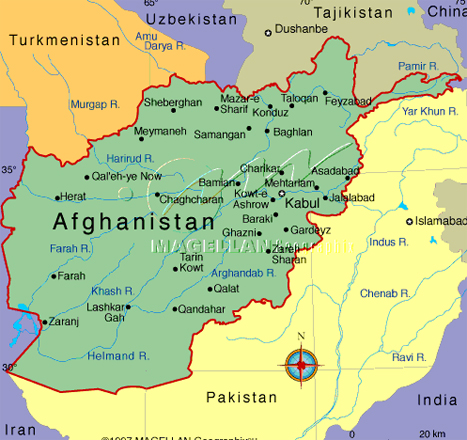A Pakistan-based insurgent group said they were responsible for the twin attacks at shrines belonging to Afghanistan's minority Shiite Muslims on Tuesday in which 63 pilgrims attending a religious festival were killed, dpa reported.
59 Afghan civilians died and more than 130 were injured in a suicide bombing at a shrine in Kabul's old city where hundreds of worshippers had gathered to observe the last day of Muharram, a Shiite mourning procession. The shrine is located some 500 metres from the presidential palace.
Four children and two women were among those killed.
In the northern Mazar-i-Sharif city, a bomb hidden in a bicycle parked near a Shiite shrine went off, killing four people and injuring four others.
Abu Bakar Mansur, a spokesman for Lashkar e-Jhangvi al-Alami, a Sunni extremist group in Pakistan, took responsibility for both attacks.
The group is responsible for dozens of attacks against Shiite minorities in Pakistan, where it is also banned. However, this is the first known attack by the group in Afghanistan.
Long War Journal, a website that tracks terrorist networks and activities, called the group "an anti-Shiite terror group with an extensive network in Pakistan that has integrated with al-Qaeda and the Taliban in Pakistan's tribal areas".
Afghan Taliban, who have been waging a decade-long insurgency in Afghanistan, denied any role in both the attacks, which it denounced as an "inhuman and un-Islamic act by the enemies of Afghanistan".
"The movement never allows anyone to endanger the security of Afghan people in the name of religion, tribe or region," Taliban spokesman Zabiullah Mujahid said in a statement.
Shiite Muslims make up some 20 per cent of Afghanistan's population. Most are members of the Hazara ethnic group.
Under the Taliban regime, which ruled Afghanistan from 1996 until 2001, Shiites were banned from observing Muharram in public and were sometimes attacked by Pashtun members of the Taliban.
But violence between the Shiites minority and Sunni majority has been rare since the fall of Taliban.
Tuesday marks the 10th day of the month of Muharram, when Shiites mourn the death of Hussein ibn Ali, the grandson of the Prophet Mohammed.
The bomber in Kabul disguised himself as one of the mourners, the police said.
"There were body parts scattered around the shrine and I also saw children lying dead," said Hamid, a witness.
Dozens of people rushed to Kabul's hospitals to look for family members and friends killed or wounded in the attack.
Shiite leaders urged calm and unity.
"Why are they killing defenseless Muslims who were mourning in a ceremony? What do they plan to achieve?" said Haji Mohammed Mohaqiq, a Shiite cleric.
Seyed Taqdusi, another cleric, said, "The actions of the enemies will not succeed to sow discord between Shiite and Sunni Muslims in Afghanistan".
"Both live together peacefully in Afghanistan," he said. "There is no political disagreement between these two sects."
"This is not an attack against Shiites, this is an attack against all Muslims."
The twin attacks, which police said occurred simultaneously, took place a day after an international conference in Germany to discuss the future of Afghanistan.
President Hamid Karzai, speaking in Germany, condemned the attacks as "horrible terrorism".
"This is the first time that on such an important religious day there is terrorism of that horrible nature," Karzai said after talks with German Chancellor Angela Merkel. "We hope for a quick recovery to those who are injured".
US State Department spokesman Mark Toner on Tuesday condemned the attacks.
When challenged on whether the Obama administration can truly claim the security situation in the embattled country is improving - many contend that it is not - Toner said the capacity of Afghan security forces is making progress.
He added, however, that lone wolf attacks or those coordinated by small groups are "difficult to stop."
"In some sense it's going to be very, very difficult to prevent individuals from carrying out these kinds of horrible terrorist attacks, no matter what the level of security is," he told reporters in Washington.
Kate Clark, an analyst with Afghanistan Analyst Network said the attack was likely to lead to more sectarian violence.
"You see these kinds of attacks quite commonly in Iraq and Pakistan where sectarian attacks are clearly directed at sites where they can cause civilian casualties," she said. "But until now Afghanistan has largely been spared that."
Even though this was an isolated incident, it was "very dangerous and likely to inflame more violence," she said.
Pakistani group claims responsibility for Afghan attack that claimed 63 lives
A Pakistan-based insurgent group said they were responsible for the twin attacks at shrines belonging to Afghanistan's minority Shiite Muslims on Tuesday in which 63 pilgrims attending a religious festival were killed, dpa reported.






